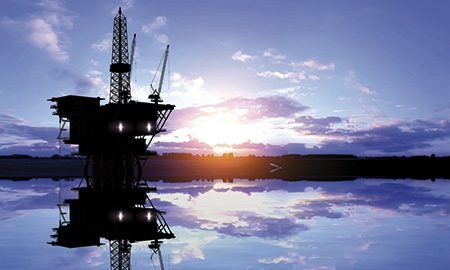The Republic of Congo, or Congo-Brazzaville, is anxious to distinguish itself from the other Congo – the Democratic Republic of Congo for good reason. These days the country is touting its oil-rich offshore reserves and campaigning for investors to help boost the country’s oil production.
“We want to encourage companies to intensify oil exploration efforts in untapped areas,” said André Raphael Loemba, the country’s Hydrocarbon Minister. “Ours is a country of tremendous natural resources and a youthful population that can help maximize these resources.”
Since assuming his governmental role in 2009, oil production in the Republic of Congo reached a peak of 310,000 barrels a day in 2010–2011, before dropping to its present day total of 277,000 barrels a day. The current wells have been active for more than 30 years, says the oil minister, and advanced technology can rehabilitate the wells and improve output but more importantly time is ripe to plumb new territory.
“These wells have a life span and over time, age and environmental intervention makes them less productive. There are techniques to stimulate older wells but that means more costly production, which is why we have put into place policies to encourage research and exploration,” says Mr. Loemba, who points to the potential wealth in the offshore fields of Moho-Bilondo in the Gulf of Guinea as an answer to waning production.
The government is in the midst of reviewing and revamping its codes and a legal framework geared toward protecting investment is expected to be in place by the end of the year.
-------------------------------------
The development of Moho Nord is being led by Total, with a 53.5% interest, while partners Chevron and the state-owned National Petroleum Company of Congo (NCPS) each own stakes of 31.5% and 15% respectively. |
Total, Congo’s leading oil producer, announced last March it was launching the development phase of its Moho Nord project, and a company news release described it as a “promising step forward in the conquest of the deep offshore in the Republic of Congo.”
The work is being carried out about 75 kilometers from Pointe-Noire and 25 kilometers west of N’Kossa in water depths ranging from 450 to 1,200 meters. Moho Nord facilities are expected to yield up to 140,000 barrels per day, with initial output slated for 2015. Total leads the project with a 53.5% interest, while partners Chevron and the state-owned National Petroleum Company of Congo (NCPS) each own stakes of 31.5% and 15% respectively.
The Moho Nord project will also target additional reserves in the southern part of the field, estimated to be the equivalent of 485 million barrels of crude.
“The development of Moho Nord marks another milestone in Total’s long established presence in the Republic of Congo and leverages our demonstrated expertise in successfully managing major projects, especially in the deep offshore,” says Yves-Louis Darricarrère, President of Total Upstream.
Mr. Loemba is looking to drum up more business like the Total/Chevron venture, and as the government’s oil minister, he is well positioned to help make that happen.
In a recent interview, Mr. Loemba described his own journey from the public schools of Brazzaville to specialty institutions in Paris, which helped form the basis of his expertise in engineering and geophysics. After spending two years at the Institute of Petroleum (IFP), he returned to Congo, where he devoted much of his career in the area of gas and oil exploration.
Part of his experience has been to nurture collaboration among the oil producers in the republic; an effort that he says has given him some considerable insight into policymaking and implementation.
“We generate policies by saying, ‘we believe that we can do this or that to increase, to improve,’” says Mr. Loemba. “This is not just purely administrative policy this is also a form of technical monitoring.”
The minister takes pride in effective policy making rooted in practical troubleshooting. “It is not uncommon that companies are finding themselves with me here around the table to discuss the purely technical problems, and together we find the solutions,” he says.
This hands-on approach could be the key to increasing productivity, which Mr. Loembra expects will rise to 310,000 barrels a day by 2017.
“In the medium to long term, we could get to 400,000 barrels a day,” he says. “Today we are working to promote certain open areas to continue the search for new deposits.”
Mr. Loemba concedes these new offshore reserves will be very costly to research and explore, making effective hydrocarbon policy all the more critical in order to mobilize funding. The government is in the midst of reviewing and revamping its codes and a legal framework geared toward protecting investment is expected to be in place by the end of the year.
Nurturing collaboration among oil producers and the government has encouraged a ‘hands-on’ approach to policymaking.
|
Initial research of the interior basin of the offshore fields is encouraging, says Mr. Loemba, though he acknowledges more in-depth exploration will be expensive and challenging.
“There are no roads, just marshes, and applying our research methods is very difficult,” he says. “We are doing superficial research with airborne methods. The results that have been interpreted so far suggest structures indicative of oil.”
Developing petroleum resources outside the United States will have the effect of balancing wealth and preventing unnecessary conflict, noting that Congo’s days of civil strife are in the past.
“There are conflicts because there was an imbalance in the distribution of knowledge and education,” says Mr. Loemba. “Today Congo is open, a country of peace; there is no war. We have institutions that are stable and work very well. One of our strengths is a young dynamic population. Our President has put into place policies to make investment a win-win.”

0 COMMENTS